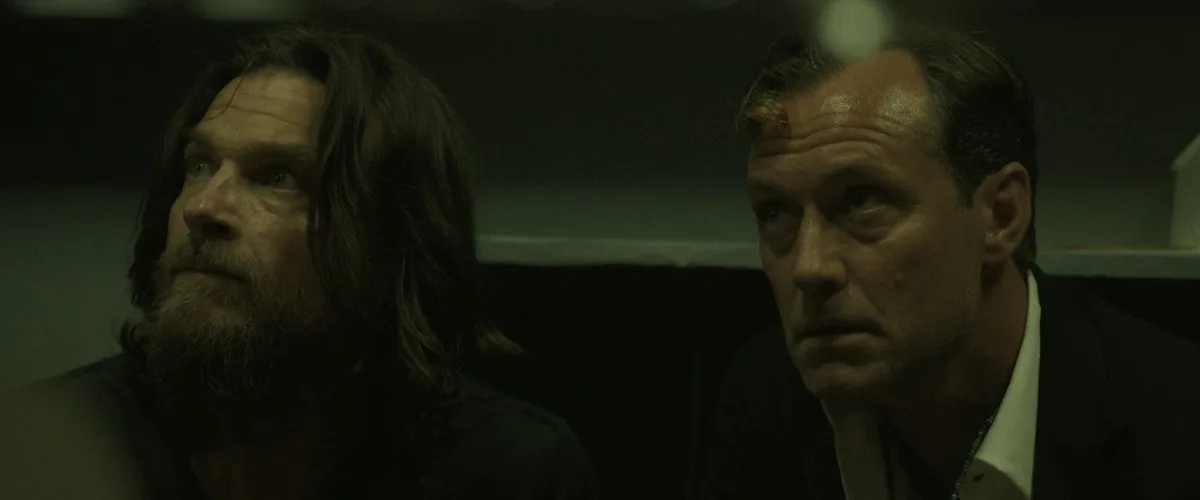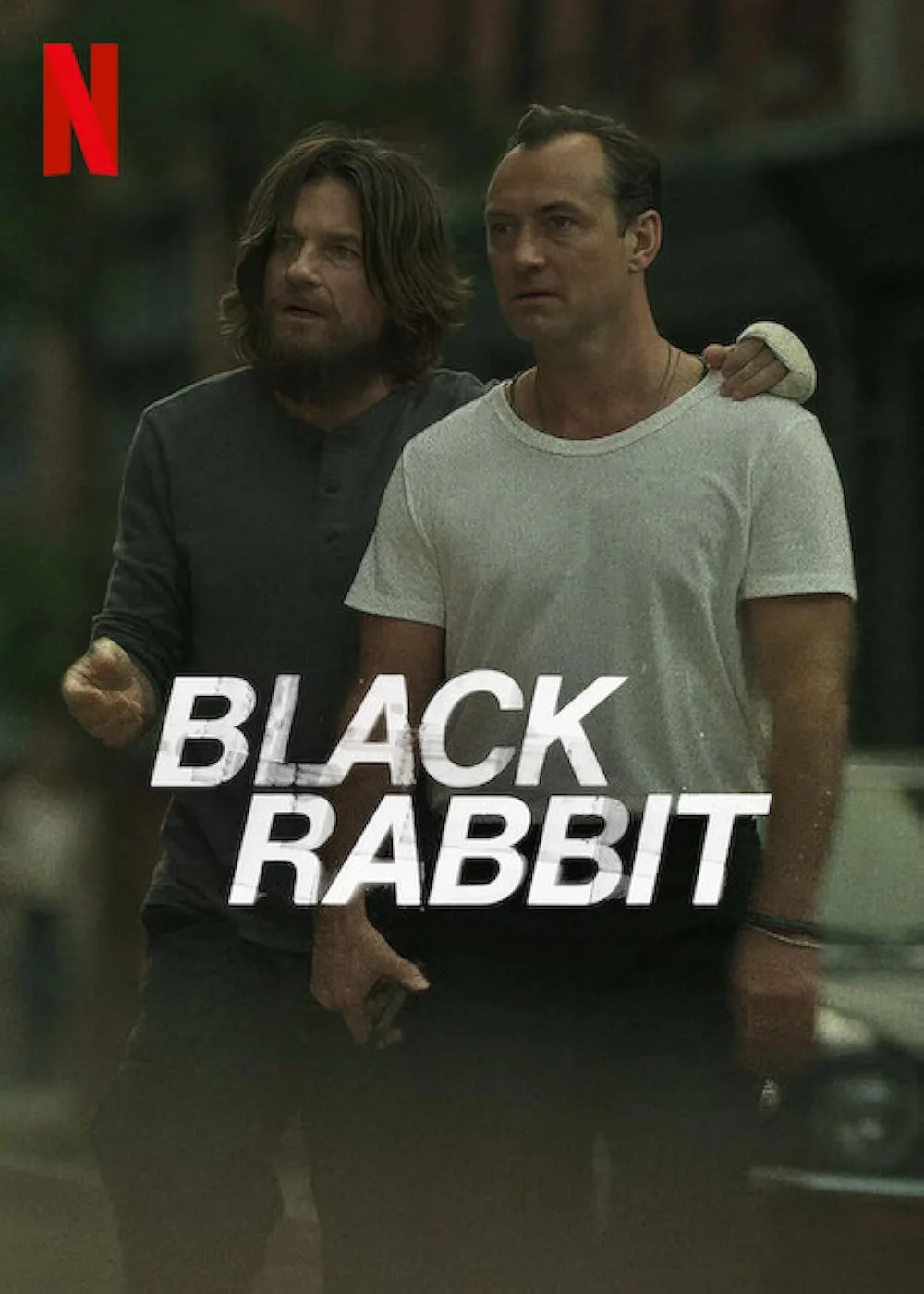Off the back of the success of “Ozark,” it makes sense to give Jason Bateman vehicles for dark, gritty crime dramas with prestige aspirations. But the problem, as Netflix’s eight-part miniseries “Black Rabbit” reveals, is that darkness can only go so far before it tips over into overwrought miserablism. The logline seems appealing: Get Bateman together with Jude Law to play brothers caught in a web of deadly ultimatums and interpersonal conflicts, all while trying to unpack their messy, codependent history. Problem is, you gotta care about the characters and the conflicts, and this miniseries just doesn’t make that happen.
Created and written by “King Richard” screenwriter Zach Baylin and co-writer Kate Susan, “Black Rabbit” throws us into the abyss nearly immediately, as Law’s suave restaurateur Jake Friedkin celebrates the opening night of his swanky New York eatery Black Rabbit with, confusingly, a big old party where people get to touch a million dollars in jewels. It’s not long after Law purrs out (in an unconvincing American accent, sorry Jude) that it’s a place “where the night can go anywhere” that it, in fact, does: Armed men with guns storm the place and hold Jake at gunpoint.
Before we see what happens, we cut back to one month earlier, as Jake’s preparation for the launch of the restaurant gets interrupted by the return of his bedraggled, no-good brother Vince (Bateman, sporting a crunchy beard and haircut so you know he’s fallen on hard times). The pair were inseparable growing up, surviving all manner of domestic trauma from childhood to become a successful Nirvana-like grunge band, which gave them the money to start the Black Rabbit together. But Vince fell on hard times and drug addiction, disappearing for years after imploding. Now he’s back, and he carries all manner of trouble with him—namely, a six-figure gambling debt that a local mobster (“CODA”’s Troy Kotsur) wants to extract from him at any price. Jake, ever the loyal brother, decides to help Vince despite himself, and it drags the pair into a web of deceit, handshake deals, and frantic bursts of violence that threatens to upend everything they’ve built.
These kinds of stories work best in the hands of people like the Coen Brothers, who can turn tales of hapless criminals in over their head into something idiosyncratic and enjoyable. “Black Rabbit,” on the other hand, stretches a cast of unsympathetic characters through the typical Netflix prestige drama soup: Whether it’s the central brothers, or the friends who get swallowed up in the soup along the way (Sope Dirisu’s loyal Wes, Jake’s best friend; Cleopatra Coleman’s Estelle, Wes’s fiancée with a thing for Jake; Abby Lee’s fragile bartender Anna), each episode is an exercise in watching people make bone-headed mistakes, or fall victim to the mistakes of others. When it’s not that, it becomes a game of hot potato over the restaurant’s finances, which, unlike “The Bear,” this show can’t manage to make tense or exciting.
The show’s look and pace don’t help either: The show leans so hard on dark, moody lighting and idiosyncratic compositions (slow pushes into dialogue scenes over a single take, shots with arbitrary negative space) that it becomes distracting and dull, and dialogue scenes aren’t treated with the focus they seem to deserve. The episodes, classic to Netflix, are all nearly an hour long, and pace themselves out at an aggravating trickle (especially when you throw in flashback scenes at the most inopportune times). You almost start to get antsy for the next severed finger.
But surely, the central performances can save it, right? Given that that’s “Black Rabbit”’s entire pedigree? God, I wish. Sure, Bateman can play these kinds of in-over-their-head family figures in his sleep (sometimes “Black Rabbit” feels like the Safdie Brothers’ version of “Arrested Development”), but here he just doesn’t register as the kind of crunchy fuckup the story needs him to be. Sure, he’s full of piss and vinegar, but he comes across as whiny rather than appropriately aggrieved. Law, for his part, tries to do his best with that American accent, but it hobbles his charm and turns Jake’s justifiable frustration into poutiness. Their dynamic feels like the closest thing “Black Rabbit” has to a central idea, teasing out the lifelong dynamic of brothers who need each other but can’t stop tearing each other down. In fits and spurts, that comes out in Law and Bateman’s performances. It’s just a shame we have to sit through so much boring noise to get to it.
By the end of “Black Rabbit”’s eight hours, it’s hard to know what to make of it besides an exercise in narrative agony. I know that’s the point: Stories of self-destruction are no stranger to film and TV, and some of the best examples make those tragedies compelling. But watching Jake and Vince refuse to get out of their own way, stumbling into one hare-brained scheme after another to get Vince out of trouble, becomes infuriating after a while. Perhaps if the story were more focused, or the supporting characters were given more to do in their wasteful subplots. Alas, this is one rabbit the creators simply couldn’t pull out of the hat.
Black Rabbit is currently streaming on Netflix.




















